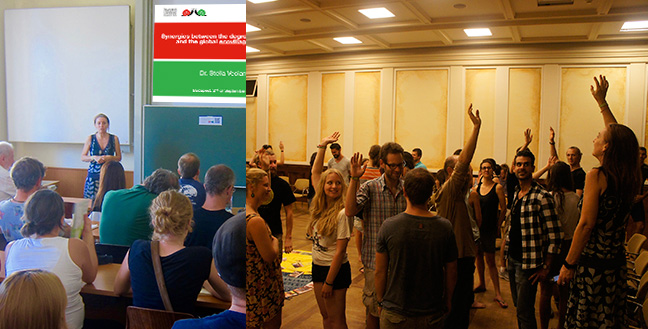There is a wide range of emancipatory alternatives working towards a social-ecological transformation. It is more important than ever to underline this. From Brexit, to the AfD (Alternative für Deutschland) in Germany, to Trump —the current political turmoil is a clear sign of the discontent that exists with the prevailing system, and that expresses itself through a societal shift towards the right and a strengthening or increased visibility of racist, misogynist, homophobic and transphobic worldviews and violence. These shifts are often interpreted as a desire or search for an alternative to the dominating political and economic system, as a regressive answer to unfettered globalisation, economisation and impoverishment. But there are also thousands of other alternatives; emancipatory and solidarity-based alternatives which respect the dignity of all human beings.
With over 30 texts collected in the project Degrowth in Movement(s) we seek to offer opposition to both the prevailing paradigm of growth, and to the increase in tendencies disdainful of human life and values. The project Degrowth in Movement(s) shows a mosaic of alternatives for a social-ecological transformation —a mosaic that is all the stronger and more fascinating through its diversity.
A few years ago, the trade unionist Hans-Jürgen Urban envisioned the mosaic of left-wing groups as the ‘beacon of hope of the post-neoliberal era’. In his view, this mosaic would be an anti-hegemonistic bloc ranging from trade unions, to movements critical of globalisation, NGOs and social self-help organisations, to critical segments of the cultural left. In this sense, Urban stated:
Just as a mosaic can unfold its beauty as a complete work even though every individual piece is still recognisable as such, a newly founded left could be seen and valued as a heterogeneous collective actor.
The project Degrowth in Movement(s) is only a sample of this ‘left-wing mosaic’ that we see as being dynamic and in constant change. The project brings together that part of the mosaic that is working on the development and testing of alternatives, that represents a social-ecological perspective and that is open to questioning capitalism and industrialism. For natural reasons, it is the segment of the mosaic that is interested in both a mutual exchange and cooperation with, and a critical examination of, degrowth. In this blog-post we present a shortened version
of the concluding chapter.
Overlaps between movements
There are many fundamental overlaps between the movements and currents —this is especially clear when viewing them together. Some of the shared aspects are especially clear. They are manifested mainly in fundamental, connecting worldviews and values, and thus do not necessarily express the specific focus of all those involved.
- Orientation towards needs
- Humans as complex, relational beings
- A comprehensive analysis (not reduce its focus to individual aspects)
- Global justice
- Rejection of the green economy
- Democratisation
- Social-ecological transformation
- Change of paradigm (many movements seek to bring about comprehensive, fundamental changes, also in our worldviews and values)
Looking at differences
Regardless of the overlaps, these are still different movements and initiatives with their own analyses, strategies, stories and supporters. There are therefore many differences, mainly in the following areas:
- Moral frame of reference (to whom do they want to achieve justice – Global North, Global South, Humans/Non-Humans)
- Relationship with capitalism
- Transformation strategies (struggle of social conflicts, building concrete alternatives, disseminating and promoting information).
- Importance of criticism of power and domination (regarding society as a whole and internally in the movement)
- Capacity to form alliances (rather strict criteria with whom to relate; seeking broad alliances)
- Organisational structure
Degrowth as an impulse and an opportunity
The authors presented a wide range of suggestions based on their view of degrowth. The content of these suggestions is as varied as the movements themselves. However, there were certain points that repeated themselves throughout many of the texts. An examination of these points might help us to understand why degrowth is currently such an attractive movement for so many people.
For many currents —especially those working on a local, practical basis— degrowth has a horizon-broadening effect, helping ideas and perspectives related to their own practices become more visible. In these cases, degrowth presents a more comprehensive perspective of, and helps to provide a framework for, their own activities (e.g.
free software movement,
open workshops,
ecovillages movement,
animal rights movement,
environmental movement - where no English version of the article is available, links lead to the German version). For others, degrowth provides a theoretical basis for debate (e.g.
right to the city), makes it possible to reach new target groups (e.g.
anti-coal movement), or helps to repoliticise critical consumption (e.g.
youth environmental movement). For those groups and actors with a greater social emphasis, degrowth opens up a horizon of ecological questions (e.g.
15M,
commons movement,
demonetisation,
right to the city). In contrast, it provides the more ecological movements with an economic-political and social framework (e.g.
animal rights movement,
environmental movement,
urban gardening). Movements that are both social and ecological thus have an a priori connection to degrowth (e.g.
food sovereignty,
common good economy,
solidarity economy). For their part, movements from the Global South (
buen vivir,
escape and migrant movement,
radical ecological democracy) see degrowth as a valuable partner in the Global North in their quest for alternative development and transformation perspectives.
Relationship with the Global South
Many authors are highly critical of the relationship between the Global South and the Global North and demand that all groups and actors address this subject. Friederike Habermann (
Peoples Global Action) argues in favour of South-North cooperation, because without it there is the risk of climate colonialism and environmental racism. In her view, we must seek a true and broad coming together, instead of a mere exchange of individual intellectuals. From the texts on
buen vivir and
post-extractivism we can learn just how important the international perspective is; as a true social-ecological transformation is only worth the name if the change in political, social-economic and cultural conditions occurs globally. In the words of
Ulrich Brand (post-extractivism):
‘For the degrowth perspective . . . it is fundamental to make clear how the dominant forms of society and production are enmeshed with other regions of the world. If not, degrowth risks becoming too provincial and overseeing the destructive basis of its own alternatives.’
Ashish Kothari (
radical ecological democracy) and Alberto Acosta (
buen vivir) stress the fact that alternatives are always rooted in their context and cannot be applied in the same way everywhere. At the same time, all actors should acknowledge the alternatives and struggles in other parts of the world and take them into account in their approaches.
Resistance and criticism of domination
One demand that is repeated very clearly throughout the texts is to be or become —everything can be learned— critical of domination structures as well as a source of resistance. As Friederike Habermann (
Peoples Global Action) states, in the course of our struggles we must not forget all the other existing power structures that restrict people’s lives, and that we must also fight against. The Trouble Everyday Collective (
queer-feminists economic criticism), for example, warns us against closing our eyes to questions of domination and believing that a seamless transformation without conflict is possible. John Jordan (
artivism) calls for a culture of resistance; i.e. that resistance be supported by a broad segment of society.
Even though a vision of transformation and a good life for all is important, movements also need a concrete field of conflict with clear antagonistic structures. The joint work between degrowth and the movement for climate justice is an example of such a field of practice: resistance against opencast coal mining (
climate justice). Do other areas harbour such a potential, areas such as care or escape and migration?
A different view of nature
Some movements and currents invite us to question our western, rationalist and dichotomous understanding of nature and to replace it with a more comprehensive view of the world complemented by a different system of values. The main question here is: How is it possible to organise a society that meets human needs and preserves the ecological foundations of life at the same time?
Buen vivir, for example, propounds an ethical system that does not revolve around human beings: where people are not seen simply as individuals, but as part of a community with nature.
Creating a material space
Another aspect that is very present is the need for concrete physical spaces that exist on a longer-term. On the one hand, this means creating ‘real labs’ (
open workshops), where the abstract is translated into the concrete and people ‘walk the talk’. On the other hand, it also involves different actors coming together in a concrete place in order to make alternatives more visible and build local relationships beyond specific events (e.g.
15M,
ecovillages movement,
right to the city,
transition towns,
urban gardening).
Overcoming the barriers of our own milieux
In order to turn a social-ecological transformation into a reality, it is indispensable that we set a truly broad movement in motion; one that reaches and involves people beyond educated, middle-class circles. As pointed out in the trade unions text, the —highly educated and relatively well-off— individuals involved in the degrowth and environmental movements lack an understanding of the situation of other groups. According to this, other social groups tend to perceive degrowth as being too ‘eco’ or esoteric and therefore off-putting.
This self-critical reflection process showed that most of the people active in many of the currents and movements are, in fact, well-educated, middle-class and white. Many authors therefore appeal to themselves and to degrowth to leave the ‘bubble’. In general, the question of how the movements and currents are composed and who participates (and how much) is perceived as important and positive, although some see it as stressful and unpleasant.
Some movements are better at mobilising large groups of people, and they can therefore open up new perspectives for some of the other groups. The
trade unions and the
Care Revolution network, for example, can teach us how to also approach social-ecological questions outside the aforementioned bubble. For its part, the
youth environmental movement brings with it the perspective of younger generations; and
buen vivir,
climate justice,
post-development,
post-extractivism and
radical ecological democracy open up perspectives from the Global South. Then many of those active in the
food sovereignty or
escape and migration movements have experience with transnational organisations and the common struggles of diverse groups of people, for example where some have experiences of escape and migration and others do not.
The next step?
One of the aims of
Degrowth in Movement(s) is to help the different alternatives see themselves as part of a mosaic of social-ecological transformation and thus become jointly active. The goal was for the movements involved to better understand each other, and for them to learn from different perspectives, strategies and experiences, thereby creating a better basis for their organisation, projects and activism. Common perspectives are the product of an exchange, of working together in the here and now, and of joining common struggles. Can the resulting alliances contribute to a social-ecological transformation, and to opposing the increase in right-wing tendencies? We hope so. What we do know is that we can’t do it alone. Whether or not this society is truly able to defend itself through democratic means will depend more than anything on whether or not more people start recognising the signs of the times and begin to actively work for social and ecological justice. There are more than enough places to start.


